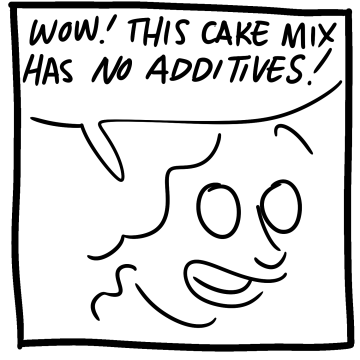2014-04-11
| 2014-04-11 |
 Title text: 2014-04-11 |
Votey
Explanation
In the realm of science, a chemical substance refers to a unique form of matter with constant chemical composition and characteristic properties. These may take the form of a single element or as chemical compounds. All substances that humans can directly interact with are made up of various chemical compounds and energy in some form or another, including air, water, earth, food, drink, and other humans. In casual, everyday parlance, however, chemicals are understood to refer to substances synthesized artificially by humans. Furthermore, due to humans showing a tendency throughout history to adulterate food and drink with various illicit and/or poisonous substances in order to cut corners and be able to make a profit at the expense of their customers' health, there is often an implication in common parlance that 'chemicals', in the casual sense of the term, are poisonous and should not be consumed.
(This, in turn, often leads to a false belief that natural, non-artificial substances are automatically healthy and/or good for you. In reality, this is completely false, as there are all sorts of toxic and poisonous substances that occur naturally both in chemical and elemental form, with a commonly cited example being bitter almonds, a natural source of the poison cyanide.)
Owing to this, as well as the fact that the term "Chemical-Free" is not regulated by the Food and Drug Administration (the US government body in charge of regulating food safety, tobacco products, caffeine products, and dietary supplements, among other things), it is common for foods and drink to advertise themselves as being "Chemical Free". This is intended to make consumers think that the food is healthy and will not harm them (while simultaneously implying that the food produced by their competitors will), making consumers more likely to buy the food item in question. In reality, for the reasons described in the first paragraph above, the term "Chemical-Free" is utterly meaningless, since, again, all substances that humans can interact with are made of chemicals. One of the few things in the universe that is not chemical in nature is dark matter, a hypothetical substance that does not interact with light, electromagnetic fields, and ordinary matter.
Most of the time, people who are aware of the fact that the assertion "Chemical-free" is scientifically meaningless just ignore such claims on product packaging and advertising, accepting it as a standard part of the kind of puffery usually seen in such situations. However, the blue-haired woman who serves as the focus of the comic subverts this usual conduct. She has opted to, instead of ignoring the label on a cherry-flavored beverage claiming that it is chemical-free, point out said meaninglessness and absurdity (from a scientific perspective) by using copious amounts of sarcasm and irony to point out why it being literal would be impossible. (Most people don't do this, on account of the fact that people who don't already know about the meaningless of the phrase 'chemical-free' tend to take having their ignorance pointed out as an insult, and people who already know just find it annoying. The woman's companion, as seen in the final panel, presumably falls into the latter category.)
In the final panel, the woman goes on to point out further discrepancies in scientific versus casual/advertising language by pointing out 'organic' sodium chloride. Unlike the term "Chemical-Free", Organic does have a legal definition regulated by the FDA. However, in contrast to the scientific use of 'organic', which means any substance containing carbon, the FDA use of the term means any food not grown with sythentic pesticides or fertilizers. Salt is not a plant, and thus has no pesticides or fertilizers involved in its production by default, so it is always organic in the FDA sense of the word; however, because salt is composed of a single sodium and chlorine atom bound together (with no carbon involved), by definition, it can never be organic in the scientific sense.
The votey continues the joke of the main comic, with the blue-haired woman remarking on a cake mix that has 'no additives', another common expression of the fear of chemicals in casual parlance.
Transcript
| This transcript was generated by a bot: The text was scraped using AWS's Textract, which may have errors. Complete transcripts describe what happens in each panel — here are some good examples to get you started (1) (2). |
- [Describe panel here]
- This drink 15 chemical free!
- This cylinder contains no ordinary matter, and yet whatever is inside behaves like a liquid and can be metabolized by humans!
- What a time to be alive! Some company has convinced dark matter, or positronium, or perhaps the fabric of spacetime itself to coalesce in this bottle, right here in this supermarket.
- And it's cherry-flavored. -and it's only 2.99! It would take more than all the energy in the universe to make this. And it's only 299!
- Are you gonna do this all day?
- Oh my god! This sodium chloride is organic?!
Votey Transcript
| This transcript was generated by a bot: The text was scraped using AWS's Textract, which may have errors. Complete transcripts describe what happens in each panel — here are some good examples to get you started (1) (2). |
- [Describe panel here]
- Wow! This cake mix has no additives! Pop so
![]() add a comment! ⋅
add a comment! ⋅ ![]() add a topic (use sparingly)! ⋅
add a topic (use sparingly)! ⋅ ![]() refresh comments!
refresh comments!
Discussion
No comments yet!
